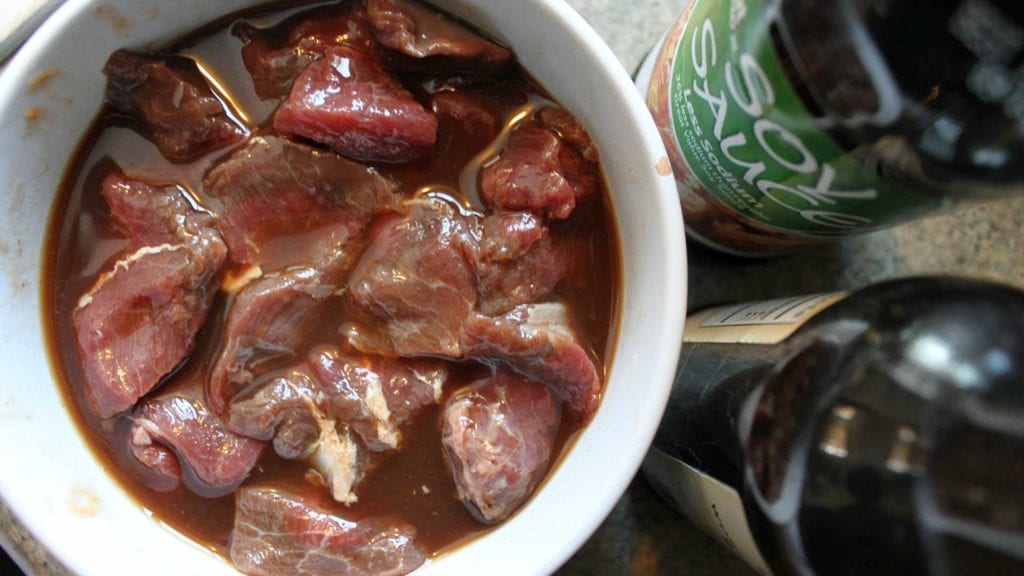Wild game often carries the stigma of being off flavored and too tough. Mature whitetails get a particularly bad rap, especially ones harvested during the rut. It’s why most guys turn their grindings into sausage and their loins into a bacon-wrapped steak. Marinades are also a typical fallback plan when wild game meat seems extra “gamey”, but do they work?
A recent poll on Twitter from @bowhunting1 showed that a lot of the bowhunting community believes so. With over 200 responses, 86% of hunters said that they “always marinade” or “sometimes marinade” their wild game. Only 14% of those polled said that they never use marinades. Clearly, marinades are a staple for many chefs who cook wild game.
Marinades for Tenderizing
Russ Parsons, a professional chef, says that marinades are rarely worth your time when trying to tenderize meat. He notes that soaking meat can be highly satisfying, but the results often aren’t. Parsons emphasizes that even the best marinades only penetrate about 1/8-inch into meat. Because of this, it only makes sense to marinade cuts of meat that have a lot of surface area in each bite, like small chicken breasts or pork steaks.

More than 80% of hunters surveyed said they often or always use marinades when cooking wild game. The question is, do they really work?
Catherine Hu, a food science writer from UCLA, mostly agrees with Parsons. Hu points out that the act of marinating is adsorption, not absorption. Adsorption is where something adheres to the outer surface, and absorption is where something penetrates all the way through. Since marinades only effect the outer surface, it’s practical to use them on thin pieces of meat.
Both food geeks say that acidic marinades are best for tenderizing, but again, the results are minimal. Acids, such as lemon juice or vinegar, denature proteins through disruption of hydrogen bonds in the collagen fibrils. Alcohols, such as beer or wine, can assist in penetration since fats present in meat are soluble in alcohol.
Marinades for Flavor
For the same reasons listed above, marinating something to add flavor is only going to help you skin deep.
Brining, though, is completely different. Brining is the act of soaking something in salt water, and is most commonly associated with Thanksgiving turkeys. J. Kenji Lopez-Alt, managing editor of SeriousEats.com, did an amazing profile on the act of brining and showed how useful it can be.
His studies showed that chicken breasts soaked in a 6% salt brine had 8% more moisture after cooking than those that weren’t brined.
The problem with brining, as noted by Lopez-Alt, is that you’re losing flavor. The added moisture is pure tap water, and thus making your meat appear to be juicier, but in actuality it’s just waterier. This means your turkey tastes less like turkey, and more like watered down turkey.
One solution that Lopez-Alt tried was flavored brines, but they never worked because of physics. Salt molecules and water molecules are attracted to each other, and as the salt would break down muscle fibers, the water would get in. Things like broths and other spices get shutout in this scenario, and remain on the outside of the meat because of the relationship that salt and water have.
Dry-brining, which is simply rubbing down meat with salt, is what Lopez-Alt says is the best option. Dry-brines work like osmosis, where the salted outside allows the meat to reabsorb its own juices. In his studies, the dry-brined chicken breasts only had 1% less moisture than the wet-brined ones, while still retaining its natural flavor.
Verdict: Fact and Fiction
Marinades are highly complex and should be used strategically. To tenderize meat, you’re better off worrying about how you hang meat, freeze it and prepare it than to lean on marinades. To flavor meat, use marinades on thinner cuts, like kabobs and steaks, rather than large roasts. To add moisture, use a simple dry-salt brine, which helps retain juiciness without sacrificing flavor.






